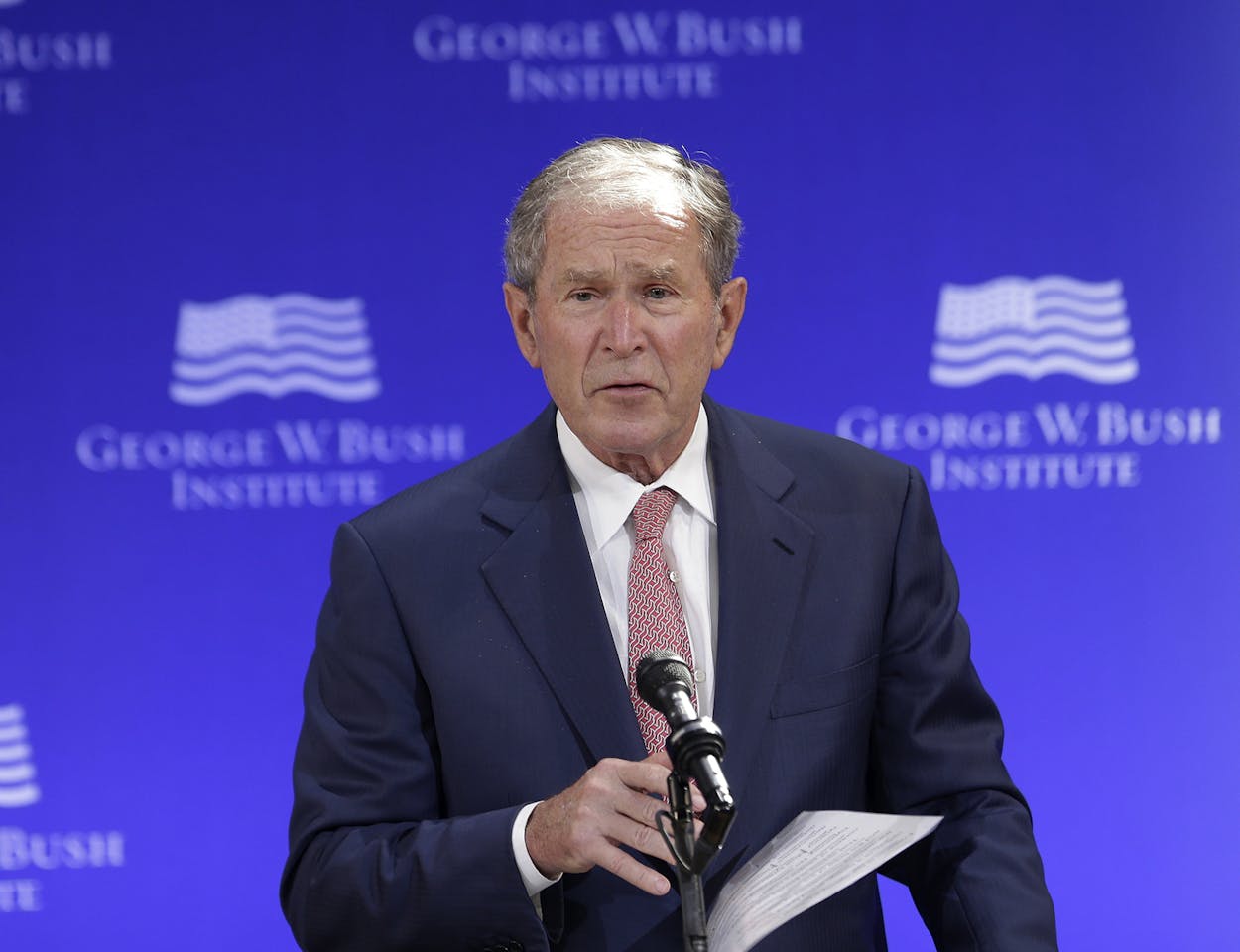Without ever mentioning President Trump by name, former President George W. Bush engaged in the fight for the identity of the Republican Party on Thursday by denouncing ideological trends that have been the hallmarks of the Trump administration: isolationism, nativism, and white supremacy. Bush’s words likely will hearten the Republicans who represented the core mainstream during his presidency and that of his father, but they may fall on deaf ears for the tea party activists who long ago dismissed Bush as a big government politician.
During a speech at the Bush Institute’s national forum on freedom, free markets, and security at the Lincoln Center in New York, the former Texas governor appeared to repudiate Trump and his politics. Bush seemed to highlight Trump’s penchant for bullying those who disagree with him politically—including some of his cabinet members—through Twitter and his speeches. “Our young people need positive role models,” Bush said. “Bullying and prejudice in our public life sets a national tone, provides permission for cruelty and bigotry, and compromises the moral education of children.”
When violence broke out earlier this year after white supremacists and counter-protesters clashed in Charlottesville, Virginia, Trump indicated that both sides were to blame, and that good people existed on either side. As they marched, white supremacists chanted “blood and soil,” a key slogan of racist Nazi ideology. Bush declared that intolerable:
Our identity as a nation – unlike many other nations – is not determined by geography or ethnicity, by soil or blood. Being an American involves the embrace of high ideals and civic responsibility. We become the heirs of Thomas Jefferson by accepting the ideal of human dignity found in the Declaration of Independence. We become the heirs of James Madison by understanding the genius and values of the U.S. Constitution. We become the heirs of Martin Luther King, Jr., by recognizing one another not by the color of their skin, but by the content of their character.
This means that people of every race, religion, and ethnicity can be fully and equally American. It means that bigotry or white supremacy in any form is blasphemy against the American creed.
Trump’s presidency has not only divided the nation into polarized groups of Republicans and Democrats, but also has, in many ways, created a rift within the Republican party. Tea party lawmakers still make up a minority of the membership of Congress, but they have driven such fear into the older mainstream Republicans that compromise with Democrats is impossible. The demand for party purity from tea party members is so strong that congressional Republicans have to decide between representing their districts and casting potentially harmful party-line votes.
Still, in the past two weeks, the old-line Republican silence started breaking. U.S. Senator Bob Corker of Tennessee, chairman of the foreign relations committee, referred to the Trump White House as an “adult day care” and told the New York Times he feared Trump was putting the nation on the path to World War III. Like Bush, U.S. Senator John McCain rebuked the president’s politics without naming him, saying the United States was moving toward “half-baked, spurious nationalism cooked up by people who would rather find scapegoats than solve problems.” (Trump has repeatedly said McCain was not a war hero, dismissing the senator because he was shot down and captured by the North Vietnamese when he served as a Navy pilot. “I like people who weren’t captured, OK?” Trump said at one point.)
In the internecine Republican warfare, Bush, Corker, and McCain already are being labeled by the far right as Republicans in name only, or RINOs. Former Trump adviser Steve Bannon referred to their split from the president as a “civil war within the Republican Party.” “They have total contempt for the forgotten man,” Bannon said. “They have total contempt for the base.” He called Corker an “absolutely disgrace.”
Bush’s speech was aimed at traditional Republicans. However, social conservatives have remained angry at Bush throughout the Obama presidency for what they saw as big government programs during his administration. Bush increased the deficit by $3.2 trillion dollars during his presidency, in part due to military spending after the 9/11 terrorist attacks and a $700 billion bailout he sponsored after the 2008 financial crisis. But the deficit also increased because of tax cuts that Bush promoted after a 2001 recession. On top of that, Bush pushed through the No Child Left Behind education program, with its common core instruction guidelines, which social conservatives saw as a nationalization of public education. On the other hand, many Democrats will remember the Bush administration as instigating the war in Iraq for political purposes, as well as using opposition to same-sex marriage to urge social conservatives to vote in his 2004 re-election campaign.
Overall, the former president’s speech is not likely to change anyone’s mind, but it may prompt others to have the courage to speak out.






